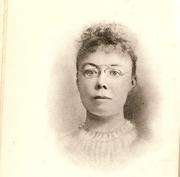Mary Elizabeth Hawker
| Mary Elizabeth Hawker | |
|---|---|
 | |
| Born |
28 January 1848 Inveraray, Scotland |
| Died |
16 June 1908 (aged 60) Herefordshire, England |
| Resting place | Lyonshall, England |
| Pen name | Lanoe Falconer |
| Occupation | Writer |
| Language | English |
| Nationality | English |
| Ethnicity | Scottish |
| Citizenship | United Kingdom |
| Genre | Mystery |
| Years active | 1890-1901 |
| Relatives | Peter Hawker (grandfather) |
Mary Elizabeth Hawker (1848–1908) was an English writer of novellas and short stories. From 1890 onwards she wrote under the pseudonym Lanoe Falconer.[1]
Life
Mary Elizabeth Hawker was born on 29 January 1848 at Inveraray, Aberdeenshire. She was the oldest daughter of Major Peter William Lanoe Hawker (1812–1857), of the 74th Highlanders, of Longparish House near Whitchurch, Hampshire, and Elizabeth Eraser. Her grandfather was Lieutenant-colonel Peter Hawker, author of Instructions to Young Sportsmen published in 1841.[2]
Hawker's education was informal and primarily self-educating, as she read many books. Her father died in 1857, and after her mother's second marriage in the fall of 1862 to Herbert Fennell, the family lived in France and Germany. Hawker learned how to speak French and German. She was also a pianist.[3]
Hawker early began to write, and a few stories and essays appeared in magazines and newspapers. Her first major work was in 1890, the initial volume of a series of novels issued by Fisher Unwin in the Pseudonym Library, a story by Hawker entitled Mademoiselle Ixe, by Lanoe Falconer. The manuscript had been previously rejected by many publishers. The story, a mystery, is about a heroine who was a governess in an English country house who was connected with Russian nihilists. The Saturday Review declared it to be "one of the finest short stories in England." Gladstone wrote and spoke the praises of the book, of which the circulation was forbidden in Russia. Over 40,000 copies of the English editions were sold, and there were also continental and American editions. It was translated into French, German, Dutch, and Italian. Subsequently she published in 1891 Cecilia de Noel, a ghost story, and The Hotel d'Angleterre.
Her productivity declined after her mother died on 23 May 1901. Hawker struggled to maintain her own mental and physical health after the death of her mother. She died from consumption on 16 June 1908, at Broxwood Court, Herefordshire, and was buried at Lyonshall in that county.[3]
Legacy
Her collected stories were published, with an introduction by Peter Rowland, in 2010.[4]
Works
- Mademoiselle Ixe, 1890
- Cecilia de Noël, 1891
- The Hôtel d’Angleterre and other stories, 1891
- Old Hampshire Vignettes, 1907
References
- ↑ Elizabeth Lee, rev. Megan A. Stephan. "Hawker, Mary Elizabeth (1848–1908)". Oxford Dictionary of National Biography (online ed.). Oxford University Press. doi:10.1093/ref:odnb/33768. (Subscription or UK public library membership required.)
- ↑ "HAWKER, Elizabeth Harker (Lanoe Falconer)". Who's Who. Vol. 59. 1907. p. 803.
- 1 2 Lee 1912.
- ↑ The Collected Stories of Lanoe Falconer, ed. with an intro. by Peter Rowland, Academic Press, 2010. ISBN 978-1-933146-81-2
- Attribution
 This article incorporates text from a publication now in the public domain: Lee, Elizabeth (1912). "Hawker, Mary Elizabeth". In Lee, Sidney. Dictionary of National Biography, 1912 supplement. London: Smith, Elder & Co.
This article incorporates text from a publication now in the public domain: Lee, Elizabeth (1912). "Hawker, Mary Elizabeth". In Lee, Sidney. Dictionary of National Biography, 1912 supplement. London: Smith, Elder & Co.
External links
- Works by Lanoe Falconer at Project Gutenberg
- Works by or about Lanoe Falconer at Internet Archive
- Works by or about Mary Elizabeth Hawker at Internet Archive
- Works by Mary Elizabeth Hawker at LibriVox (public domain audiobooks)

- Lanoe Falconer (Mary Elizabeth Hawker) (1848–1908) at the Salamanca Corpus